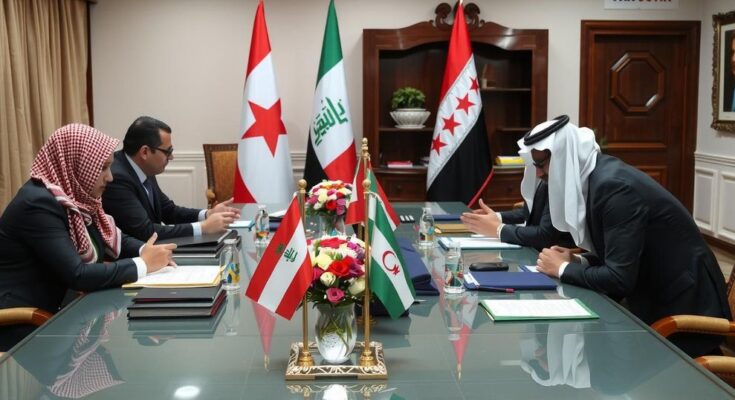The UAE and Syria discussed enhancing bilateral relations in a historic meeting, marking Syria’s first official visit since Assad’s removal. UAE’s Foreign Minister Sheikh Abdullah bin Zayed Al Nahyan reaffirmed support for Syria’s sovereignty while expressing vigilance regarding the new Syrian leadership amid concerns about political Islam and Turkish influence.
Foreign ministers from the United Arab Emirates (UAE) and Syria convened on Monday to explore avenues for enhancing bilateral relations, marking the first official visit from Syria since the ousting of President Bashar al-Assad. Sheikh Abdullah bin Zayed Al Nahyan, the UAE’s Foreign Minister, and Syria’s new Foreign Minister Asaad al-Shaibani discussed their commitment to reinforcing the fraternal ties between their nations, as reported by the UAE’s WAM news agency. The UAE played a crucial role in advocating for the restoration of ties with the Syrian regime prior to Assad’s fall, culminating in Syria’s rejoining of the Arab League in 2023.
During the meetings in Abu Dhabi, which also included Syrian Defence Minister Murhaf Abu Qasra and intelligence chief Anas Khattab, Sheikh Abdullah reaffirmed the UAE’s unwavering support for Syria’s territorial integrity and sovereignty. This visit follows a series of diplomatic engagements by Syrian officials with Gulf neighbors, having visited Qatar and Saudi Arabia in recent days. Furthermore, the Syrian official news agency, SANA, reported that Shaibani expressed eagerness to develop constructive bilateral relations through a social media post upon his arrival.
The newly established Syrian interim government assumed power following the gains by rebel forces in Damascus, marking a significant shift after over a decade of civil unrest. Analysts have noted the UAE’s deep concerns regarding the new Syrian leadership, reflecting apprehensions about political Islam and Turkey’s growing influence in the region. Notably, both Qatar and Turkey have reopened their embassies in Damascus since Assad’s relocation to Moscow, both maintaining connections with anti-Assad factions.
The UAE presidential adviser, Anwar Gargash, previously articulated concerns regarding the Islamic orientation of Syria’s new leaders, deeming it ‘quite worrying.’ This multifaceted engagement reflects the intricate dynamics of regional politics and the challenges faced by the UAE as it navigates its relationship with the new Syrian authorities.
The recent diplomatic engagements between the UAE and Syria take place against a backdrop of historical tensions and shifting alliances in the region. The UAE’s support for restoring ties with Assad signifies a departure from the initial stance that aligned with the anti-Assad forces during the civil war. The political landscape remains complex, with various countries like Turkey and Qatar having maintained interactions with opposition groups, further complicating the UAE’s position amidst fears of political Islam’s influence in Syria and concerns over regional stability.
In conclusion, the meeting between the UAE and Syrian foreign ministers denotes an important step towards strengthening diplomatic relations, amidst cautious optimism and underlying skepticism. As the UAE seeks to enhance ties, it must navigate significant geopolitical challenges, balancing its interests against concerns regarding the new leadership in Syria. This interaction highlights the ongoing shifts in Middle Eastern alliances and the quest for stability in the post-civil war landscape of Syria.
Original Source: www.newarab.com




